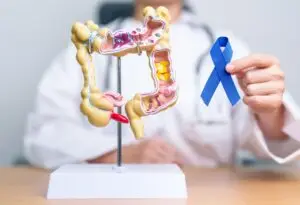Reviewed by Kristen Reynolds, MD of Forum Health Mequon and Forum Health Brookfield
At-A-Glance
- The Women’s Health Initiative study was largely flawed leading to a significant decline in hormone replacement therapy and placing women at a disadvantage.
- An NIH study showed that women on BHRT live 20% longer, neurodegenerative diseases are reduced, and they have statistically less breast, ovarian, uterine, lung and colorectal cancer.
- Hormone therapy is critical for more than just menopause symptom relief. It aids in bone and muscle mass, heart health, metabolism, cognition and more – for both men and women.
Hormones are crucial for all stages of life and when they are in balance, your mind and body are in balance. Let’s debunk some common myths around hormone therapy, what the Women’s Health Initiative got wrong and why hormone therapy is critical as you age.
The Women’s Health Initiative (WHI) Study that Sounded the Alarms on Hormone Therapy
If you’re not already familiar, the Women’s Health Initiative (WHI) hormone therapy (HT) trials of 2002 was a major long-term national health study initiated by the National Institutes of Health (NIH) to address the most common causes of death, disability and impaired quality of life in postmenopausal women.
One of the most significant findings of the WHI was related to hormone therapy. The study found that the risks of combined estrogen and progestin hormone therapy used to treat symptoms of menopause, outweighed the benefits for most women and increased the risk of stroke, blood clots, heart attacks, and breast cancer.
This led to a significant shift in clinical practice regarding hormone therapy for menopausal symptoms. Additionally, the trial was stopped early due to concerns about risks, leading to incomplete data and potentially overstated conclusions.

Opinions of the WHI’s findings have reversed over the years with many integrative and functional medicine practitioners finding the study flawed and placing women at a major disadvantage as outlined in these articles from the NIH and Science Direct.
Flaws in the Women’s Health Initiative (WHI) hormone therapy (HT) trials include:
- Age of Participants: The WHI included predominantly older women, with an average age of 63 at enrollment. Therefore, findings may not be applicable to younger women experiencing menopausal symptoms, as risks and benefits of hormone therapy might differ in women closer to menopause.
- Hormone Formulations: The WHI primarily studied the use of conjugated equine estrogens (CEE) combined with medroxyprogesterone acetate (MPA) for hormone therapy. Different types of hormone formulations, such as bioidentical hormones or different delivery methods (e.g., transdermal patches), might yield different results in terms of risks and benefits.
- Study Design: Concerns about the study’s design in that the dosages used may not have reflected common clinical practice or may have been too high for many women.
- Participant Characteristics: The women in the WHI had a range of preexisting health conditions and risk factors, which may have influenced the study outcomes. The findings may not be generalizable to healthier populations or women without specific risk factors.
- Misinterpretation of Results: The initial reporting of the WHI findings emphasized the risks associated with hormone therapy, leading to widespread concern and a significant decline in hormone therapy use. However, subsequent analyses and reevaluations have suggested that the risks might have been overstated, and the benefits for symptom relief and bone health in certain populations may have been downplayed.
Why Hormone Replacement Therapy is Critical for Women’s Health?
Hormones play a critical role in women’s health throughout their lives from regulating fertility and libido, to pregnancy, menopause, and aging. Hormones are also necessary for metabolism, inflammation, cognition, heart health, vibrant skin and muscle and bone mass.
Let’s be clear. Hormones are essential for life!
Inflammation Reduction
All sex hormones are anti-inflammatory, and we know that inflammation is the root cause of essentially all chronic diseases.

Menopause Symptom Relief + Reduced Cancer Risk
The most common reason women seek BHRT is for the real and debilitating symptoms of perimenopause, including hot flashes, night sweats, disrupted sleep, fatigue, mood disorders, weight gain and irritability. BHRT is wonderful in helping to alleviate these symptoms, and the risk of breast cancer from BHRT use is LOW. In fact, the right hormones bioidentical and balanced correctly, have been shown to DECREASE the risk of cancer.
An NIH study of seven million post-menopausal women published in May 2022 showed that women on BHRT live 20% longer, neurodegenerative diseases are reduced, and they have statistically less breast, ovarian, uterine, lung and colorectal cancer. However, you need to use the correct estrogen and progesterone replacement.

Optimized Metabolism
Metabolism is the chemical reactions in the body that turn food into energy and drive whether you feel well or not. A healthy metabolism controls weight, blood sugar and insulin levels, which must be perfect for optimal health, and elevated insulin can lead to inflammation – the culprit of every chronic illness.
Insulin, leptin, thyroid hormones, and cortisol are all hormones too, and you need to make sure these are in balance. Testosterone in men and women, plays an important role in decreasing insulin resistance, balancing cholesterol, optimizing metabolism and even improving cognition.
Better Brain Health
This may come as a surprise, but hormones are crucial for brain health. Did you know that testosterone is neuroprotective? The same holds true for estrogen and progesterone but the right kind and not the estrogen from horse urine and the fake progestogens used in the Women’s Health Initiative.
In Europe they use IV progesterone for traumatic brain injuries and stroke because it is so neuroprotective.
Studies show that women on the right estrogen replacement have a 50% decreased risk of Alzheimer’s disease compared to women not using estrogen replacement, and starting BHRT around the time of menopause is best. Can you imagine cutting your risk of dementia in half? That is huge.
In addition, the hippocampus, the place in the brain associated with memories and motivation, is larger in postmenopausal women using hormone replacement therapy as compared to those who never used hormones. BHRT has also been shown to suppress the APOE-4 Alzheimer’s gene.
Healthy Heart
Hormones are also very important for cardiovascular health. Estrogen has protective effects on the cardiovascular system, including maintaining healthy blood vessel function and lipid metabolism. Hormonal imbalances, particularly low estrogen levels, may contribute to an increased risk of heart disease and stroke in women.
Strong Bones

Hormones are critical for maintaining muscle mass and bone density. Estrogen plays a significant role in maintaining bone density and strength. Declining estrogen levels during menopause can increase the risk of osteoporosis and fractures. Hormonal balance is crucial for preserving bone health and reducing the risk of osteoporosis-related complications.
Gut Health
Finally, we cannot forget the importance of the gut.
Meet a new term in functional medicine: the estrobolome – this term refers to the collection of bacteria in the gut which is capable of metabolizing and modulating the body’s circulating estrogen.
The estrobolome affects estrogen levels, which in turn can impact weight, libido and mood. And guess what? The first place we start in functional medicine is the gut.
How a Forum Health Provider Can Help You Navigate Your Hormone Therapy Journey
Bioidentical Hormone Replacement therapy is a powerful and effective treatment to help you feel and look younger, bring back the vitality in your life and achieve optimal wellness.
Our providers are experts in hormone therapy as well as addressing nutrition, exercise, sleep, stress management, detoxification, gut health, and more. We consider your whole, unique mind and body when we “test, not guess” and consider additional interventions with BHRT.






